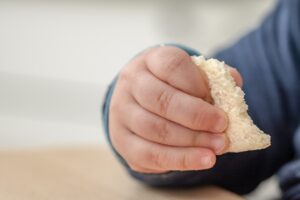Interactions between food microstructure, the gut microbiome, and health outcomes of infants during weaning
Understanding the impact microstructure of the food matrix has on the structure and function of the weaning infant’s gut microbiome, and how this affects health outcomes.
The challenge

Food ingredients. Credit – Rachel Loughman
The role of different food components and ingredients has been widely studied to understand their impact on the human gut microbiome. How food can influence the gut microbiome and the health outcomes of the human host is introduced in the hungry microbiome video. The introduction of solid food for the first time during the weaning phase will diversify the gut microbiome by introducing vast plant source carbohydrates. The weaning phase also presents a window of opportunity to shape the gut microbiome by dietary strategies that can provide long-term health benefits.
The microstructure of a food matrix, such as liquids (milk), gels (jelly), emulsions (mayo), and solid foods (extruded bars) can influence the digestion kinetics. Moreover, it is believed that the food matrix can affect the nutrient delivery to the colon, which may affect gut microbiome ecology (what microbes are present) and subsequent health outcomes for individuals, for example, the regulation of obesity or immune response. Current research focuses on the nutrient availability during the weaning stage, where there is a shift from liquid to solid structured foods and its effect on the infant’s gut microbiome is less understood. Therefore, the interactions between the food microstructure, gut microbiome, and health outcomes in weaning infants need further investigation.
Our response

Toddler hand. Credit – Myriams Fotos
MOSH researchers will use laboratory-based in vitro experiments to better understand the impact of food microstructure on the delivery of prebiotic foods to the gut microbiome during infant weaning. Further factors that might affect baby food structure and a weaning infant’s gut microbiome, such as processing conditions (how foods are prepared) or probiotic supplementation (food containing live microbial cultures), will also be incorporated into the research. How these prebiotic foods change the gut microbiome ecology and function (what the microbes are doing), and how these factors might affect different health markers, such as inflammatory reactions or intestinal barrier functionality will also be investigated. The outcome of the current project will contribute to the goals of the Baby Gut Health Study, which is to develop baby food that promotes a healthy and resilient gut microbiota.
The food and human health microbiome team
Mr Shibo Ma – Postgraduate, Food Microbiology
Dr Amy Logan – Impact lead for Healthy Foods
Dr Senaka Ranadheera (The University of Melbourne)
Dr Jess Gray – Postdoctoral Fellow, Food Microbiology
Dr Joanna Gambetta – Team Leader, Food Chemistry
Dr Simone Osborne – Project Leader, Animal Nutrition
Ms Rama Addepalli – Research Technician, Animal Nutrition
Dr Roya Afshari – CERC Postdoctoral Fellow, Food Chemistry
Dr Penny Galbraith – CERC Postdoctoral Fellow, Applied Microbiology
Dr Yanan Wang – Research Scientist, Nutritional Interventions
Dr Michael Conlon – Principal Research Scientist, Nutritional Interventions
Dr Narelle Fegan – Principal Research Scientist, Food Microbiology
